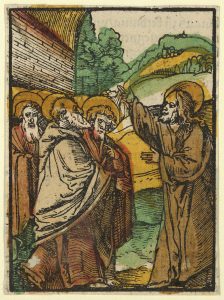Illuminations on the Lectionary readings for June 11, 2023 (Pentecost 2A)
First Reading (Track One): Genesis 18:1-15, (21:1-7)
We are now in the period that the Catholic Church (and some Episcopalians) call “Ordinary Time” because this section of the liturgical year falls outside the major seasons of the church calendar.

Christ Teaching the Disciples, from Das Plenarium (1517), hand-colored woodcut by Hans Schäufelein (1480–c.1540). Metropolitan Museum of Art, New York City. (Click image to enlarge)
Our Gospels through this period recall the public ministry of Jesus as told by Matthew, in Galilee and along the long road to Jerusalem and the Cross. These works and words of Jesus, his teachings and healings, may seem “ordinary” in contrast with the Incarnation and the Resurrection, but they merit our attention as we learn to follow in Jesus’s way. Our readings Sunday begin in Genesis with God’s assurance, through three mysterious strangers, that Abraham and Sarah will have a son, and that their offspring will inherit the Promised Land.
First Reading (Track Two): Exodus 19:2-8a
Our Track Two first reading turns to the book of Exodus, where we find Moses in a narrative that reflects God’s covenant with Abraham and from which we hear distant echoes in today’s Gospel. Moses has gone up Mount Sinai to receive God’s instructions while the people are camped in the wilderness below. God speaks from the mountaintop, telling Moses, “If you obey my voice and keep my covenant, you shall be my treasured possession out of all the peoples. … you shall be for me a priestly kingdom and a holy nation. At God’s instruction, Moses returns to the elders of the people, quickly gaining their agreement to be in lasting covenant with God: “Everything that the Lord has spoken we will do.”
Psalm (Track One): Psalm 116:1, 10-17
We also heard this Psalm just two months ago, midway in Eastertide. It is a Psalm of thanksgiving, clearly intended as a grateful prayer thanking God for recovery from illness. The portion that we sing on Sunday gives thanks for the transforming joy that comes with recovery and resurrection. In the joy of restored life, we offer thanks to God, who frees us from the snares of death.
Psalm (Track Two): Psalm 100
This joyful hymn, which we often hear in Morning Prayer where it is called the Jubilate (“Be Joyful” in Latin, from its opening verse in the Psaltery), draws its joyous theme from the same truth that Moses taught the elders at Sinai: We are God’s creation, God’s own people, and – using a metaphor that we also hear and love in Psalm 23 – the sheep of God’s pasture.
Second Reading: Romans 5:1-8
In our summerlong visit with Paul’s letter to the Romans, we will hear him memorably working out his evolving theology of Christ, the Spirit and salvation. In this passage, which we also heard recently during Lent, Paul encourages the Roman Christians to love each other and heal their differences in spite of their own suffering. He reminds them that even Jesus suffered and died by crucifixion. He urges the Roman Christians to learn endurance in their own suffering, remembering that even though they are sinners, they are justified through faith and saved through the cross.
Gospel: Matthew 9:35-10:8(9-23)
As Jesus continued his teaching throughout Galilee, we hear from Matthew in Sunday’s Gospel, he felt compassion for the crowds around him “because they were harassed and helpless, like sheep without a shepherd.” He summoned the 12 apostles, sending them out among “the lost sheep of Israel” like laborers into the harvest. He told them to proclaim the good news, as he had done, that the kingdom of heaven has come near. As they went, facing possible persecution and distrust, Jesus empowered them to do the miraculous things that he himself had been doing: “Cure the sick, raise the dead, cleanse the lepers, and cast out demons.”
